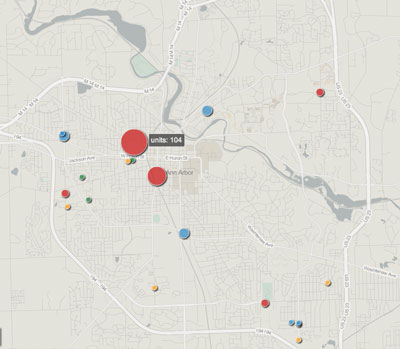Ann Arbor Takes Steps to Convert Public Housing
The Ann Arbor city council has taken steps to convert the city’s public housing stock to a public/private system in a effort to address a roughly $520,000 deficit in capital improvements funding each year for the next 15 years. Key among those steps was a transfer of ownership from the city of Ann Arbor to the Ann Arbor Housing Commission, which currently manages but does not own the 355 units of public housing in the city.
The action came at the council’s June 3, 2013 meeting. AAHC executive director Jennifer Hall had briefed the council on the issue at a Feb. 11, 2013 work session.
At its June 3 meeting, the council approved a total of four resolutions affecting the AAHC. A fifth one was removed from the agenda. All were related to the proposed conversion of public housing managed by AAHC to a public/private partnership that would fund the units through project-based vouchers. The conversion would take place under HUD’s Rental Assistance Demonstration (RAD) program. Several million dollars worth of capital improvements will be financed through low-income housing tax credits.
The first resolution transferred ownership of the city-owned properties, currently managed by the AAHC, to the AAHC itself. As a land transaction, it required eight votes to pass. The council’s vote was unanimous, and included support from Stephen Kunselman (Ward 3). Four months ago at a city council working session, Kunselman had said he’d vote against the proposal. On June 3 he still expressed deep reservations about the step, saying that he feared it meant pushing out the poorest of the poor.
Postponement wasn’t a feasible option, because the AAHC’s first grant application is due June 15 – and that grant application needs to demonstrate “site control.” The AAHC’s original plan was eventually to transfer ownership to a public/private partnership to facilitate the low-income housing tax credit financing. The AAHC selected a co-developer earlier this year at its Jan. 10, 2013 meeting. However, the current plan is for the AAHC to own the land and the buildings, and to convey them through a ground lease to the limited partnership. That’s feasible because a long-term ground lease will satisfy the IRS’s requirement that the limited partnership have an ownership interest in the property.
After the land transfer, the council approved a resolution stating that the current employees of the housing commission are currently city employees and will continue to be city employees – after the conversion of AAHC properties to project-based vouchers. The third resolution approved by the council was a payment in lieu of taxes for properties in Phase 1 of the planned conversion: 106 Packard Road, 727 Miller, 1701-1747 Green Road, 2742 Packard, and 800-890 South Maple. That will exempt the AAHC from paying property taxes on the properties.

Ann Arbor Housing Commission properties. Color coding indicates phase: Phase 1 (red); Phase 2 (orange); Phase 3 (blue), Phase 4 (green). Image links to dynamic map.
The fourth resolution asked for a $200,000 appropriation from the city’s affordable housing trust fund to support a loan application for improvements at 727 Miller (Miller Manor) and 800-890 South Maple.
The final item was removed from the agenda at the request of AAHC executive director Jennifer Hall. It had been a request from the city’s general fund to backstop anticipated deficits – even if the AAHC converted all its units to project-based vouchers. The resolution had asked for at least $124,000 – based on “Scenario 3″ described in the council’s information packet – or up to $461,000 if HUD did not allow AAHC to convert its units all in one go (before all financing is formally secured). The request to change the rules had been made by AAHC of HUD in order to lessen the impacts of federal sequestration. But according to Hall, HUD didn’t agree to AAHC’s request to do that. So it’s the $461,000 figure cited in the council’s resolution that would likely come out of the general fund reserve for the three fiscal years FY 2014-16. That item will likely come back to the council for consideration at a subsequent meeting.
The need to rethink the funding and maintenance strategy for Ann Arbor public housing is based on a capital needs assessment conducted in 2009, which determined that AAHC had $40,337 per unit in capital needs over the next 15 years. But at current HUD funding rates, AAHC would receive only $18,000 per unit – which is a $22,000 per unit shortfall in capital repair funding. Without some other funding strategy for its 355 units, AAHC would face roughly $7.8 million or about $520,000 per year in unmet capital needs.
This brief was filed from the city council’s chambers on the second floor of city hall, located at 301 E. Huron. A more detailed report will follow: [link]



